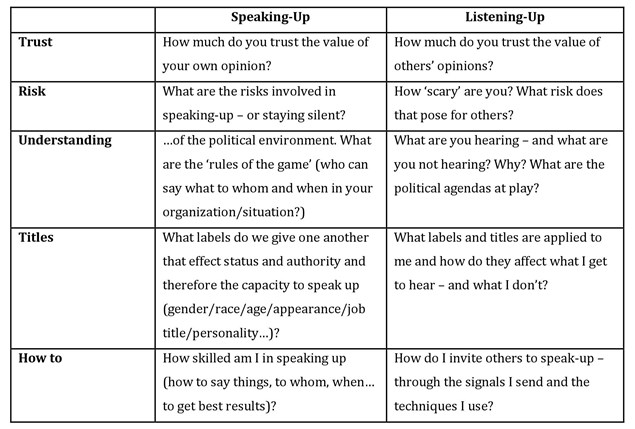- Managing people
Speaking Up at Work
How to overcome the barriers to Speaking Truth to Power
Humans are pre-conditioned to protect themselves from harm. In the modern world this means we are frequently very sensitive to the risk of offending or displeasing those who have influence over us and most often this means our bosses. In a business environment which is increasingly seeking authenticity and truth as solutions to improving working practice and requires constant innovations and new ideas to flourish, this is a significant barrier for organizations to overcome – and the way employees feel prevented from ‘speaking truth to power’ is not at all well-understood in most organizations. Most leaders view themselves as being very approachable.
Research I am currently doing with my colleague John Higgins, explores the issues around how employees can constructively challenge the status quo in their organizations, and so add a diversity of input and a bottom-up approach to management information. We have interviewed over 150 senior managers from organizations as diverse as the military, health services, banking and manufacturing, and visited multiple organizations to get feedback from all levels to gain a perspective on what employees think about ‘speaking-up’. The ‘up’ being important, as one key aspect of our research is how people share their thoughts and views with those above them in the organizational hierarchy. We also gained insight into what leaders, at all levels, think of their ability to receive such feedback.
A common view expressed by leaders so far in our research, unsurprisingly, is that they believe their reports should be comfortable to tell them the harsh truths and are keen for it to happen more often. However, if we are in any position of power, whether hierarchical or otherwise, we often do not realise how we silence others: we have a big ‘blind-spot’ on this. When we ask direct reports for their views, many raise their eyebrows and effectively say “Speak-up? That’s never going to happen!” as they believe they will either be ignored or marked out as a trouble-maker. We are conditioned to protect ourselves, so why should we take the risk, when the reward is so unclear for doing so?
This dynamic is clearly ‘relational’, in as much as both sides need to be aware of their actions and responses – which are often motivated by perceptions of power and authority – in order to improve the process. We have established a five-point framework to help people understand these dynamics around ‘speaking truth to power’, which is captured in the mnemonic ‘TRUTH’.

We have noticed three classic traps that act as a barrier to people speaking-up. Firstly, we doubt ourselves and this is the root of the ‘impostor syndrome’. Rather than risk making a public statement, we censor ourselves and opt for silence (in case we have misunderstood the situation or we fail to put our ideas forward eloquently). Secondly, we ‘catastrophise’, imagining the worst possible outcome. A relatively small issue spirals upwards and outwards beyond our control – ‘If I speak up, my boss won’t like me, then I’ll lose my job and then I won’t be able to pay the mortgage…’ and so on. The third common trap is the ‘How to…’ issue, where we speak-up in the way that suits us rather than the other person. This is particularly common when there are significant cultural differences through nationality and language or differences in knowledge and expertise.
…………………………………………………………………………………………………………………………….
Take part in the Truth to Power research by completing this short online survey. By participating, you can request to receive the full research report, free, when it is published.
Click Here for Survey
……………………………………………………………………………………………………………………………
There are also traps we fall into that prevent us listening up well. These I explain in my TEDx video here, but can be summarised as: being unaware of our influence and therefore perceived ‘scariness’; denying our natural human bias to favour some people’s opinion over others; and sending ‘shut-up’ signals, rather than ‘speak-up’ signals, through the words, tone or body language we use.
For organizations to prosper it is important that there is an efficient system, as there is in the body, to channel feedback and discoveries from the extremities to the control centres. If those systems are disabled so will the organization’s performance and potential be.
……………………………………………………………………………………………………………………
If your department or team are interested in finding out more about your ‘truth to power’ culture, we can collate survey results for specific groups and feed them back to you for free.
Contact me here to find out more.
……………………………………………………………………………………………………………………………
Hult Ashridge Executive Education helps organizations around the world improve their leadership talent, strategic thinking and organizational culture.
ARTICLES YOU MIGHT LIKE
RESEARCH
Despite its detractors, Performance Measurement and Management can be made fit for the future
DEVELOPING LEADERS QUARTERLY MAGAZINE AND WEEKLY BRIEFING EMAILS


































